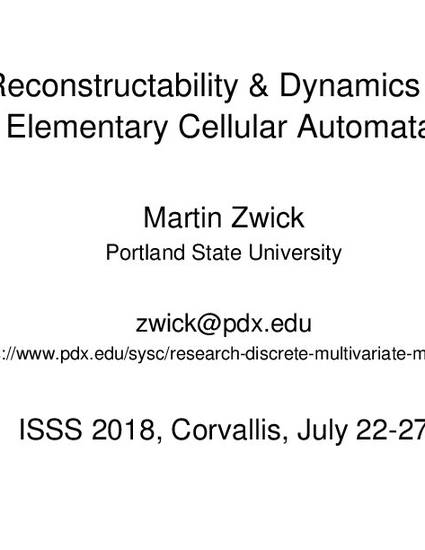
Presentation
Reconstructability & Dynamics of Elementary Cellular Automata
International Society for the Systems Sciences
(2018)
Abstract
Reconstructability analysis is a method to determine whether a multivariate relation, defined set- or information-theoretically, is decomposable with or without loss (reduction in constraint) into lower ordinality relations. Set-theoretic reconstructability analysis (SRA) is used to characterize the mappings of elementary cellular automata. The extent of decomposition possible for each mapping without loss is more effective than the l parameter (Walker & Ashby, Langton) as a predictor of chaotic dynamics, and non-decomposable mappings tend to produce chaos. SRA yields not only the simplest lossless structure but also a vector of losses for all decomposed structures, indexed by parameter t. This vector subsumes l, Wuensche’s Z parameter, and Walker & Ashby’s fluency, memory, and hesitancy parameters within a single framework, and is a strong but still imperfect predictor of the dynamics. The set-theoretic constraint losses are analogous to information distances in information-theoretic reconstructability analysis (IRA). IRA captures the same information as SRA, but allows the Walker-Ashby measures to be explicitly defined within a more encompassing framework. Of the parameters tested, fluency is the best scalar predictor of chaos.
Keywords
- Reconstructability Analysis,
- Elementary Cellular Automata,
- discrete dynamics,
- chaos,
- lambda
Disciplines
Publication Date
July 22, 2018
Location
Corvalis, Oregon
Citation Information
Zwick, M. (2018). “Reconstructability & Dynamics of Elementary Cellular Automata.” Presented at the International Society for the Systems Sciences 2018, Corvallis, OR, July 22-27.
